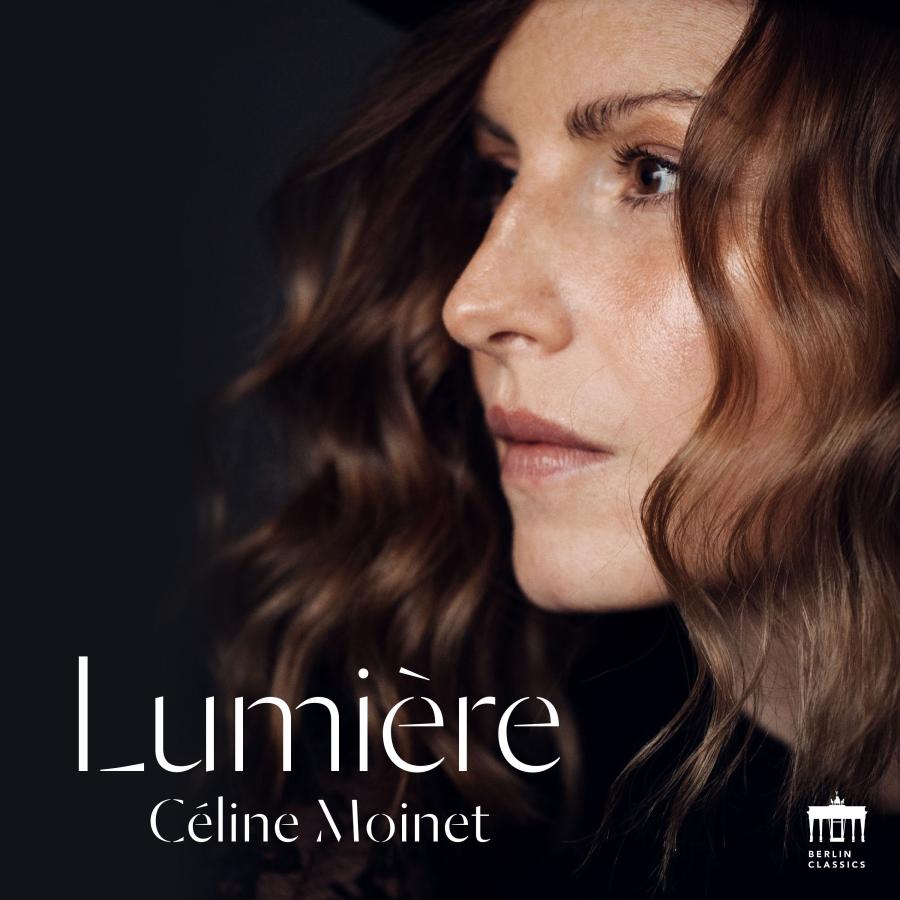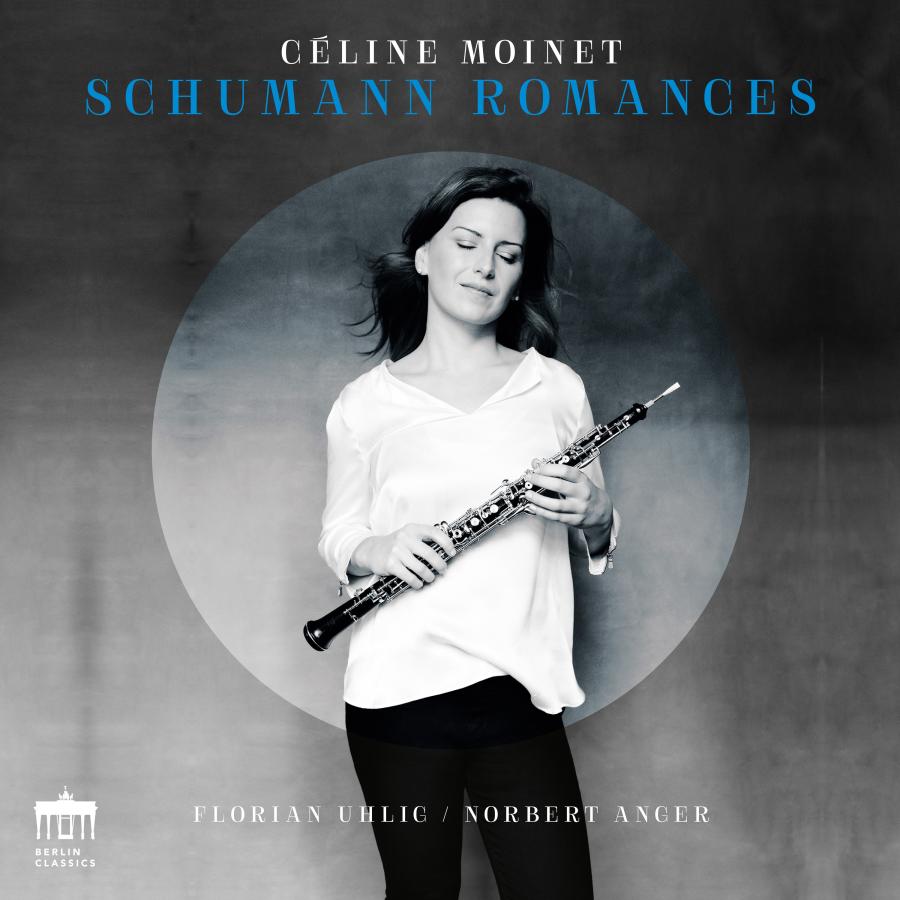On her new album “Lumière”, released on the Berlin Classics label on March 25, 2022, Céline Moinet makes the oboe really shine – and the cor anglais too. Joined by bassoonist Sophie Dervaux and pianist Florian Uhlig, Moinet turns her gaze towards her French homeland and presents a programme that is French through and through: music reminiscent of spring in the south of France, recalling its lightness, its perfume and its bright, radiant colours. Works by Francis Poulenc, Claude Debussy, Maurice Ravel and Saint-Saens make up a bouquet of Impressionist masterpieces, which make the oboe sing, keep it in motion, always providing elegant entertainment without ever sounding hackneyed.
The “Trio for Oboe, Bassoon and Piano” of 1926 by Poulenc is one of the first works since the Classical era to highlight two woodwind instruments in a chamber ensemble. Musicians Céline Moinet and Sophie Dervaux are linked by more than their French origin. Both soloists are also orchestral musicians, Moinet with the Dresden Staatskapelle, Dervaux with the Vienna Philharmonic. They have played the Trio together several times already. On this album, now, the two musicians find a language of their own: “We understood each other at once without needing to talk too much about it, ” recalls Moinet. “Although we know each other so well and are very similar, we can still surprise each other now and then – even in the recording studio.” Florian Uhlig is another musician who Moinet has worked closely with for many years. It was in 2017 that the album “Schumann Romances” finally appeared, with Moinet and Uhlig making music together.
Another piece by Poulenc on the album is a late work of his, the “Sonata for Oboe and Piano”, which the composer dedicated to his friend Sergei Prokofiev. Enhancing the album are various arrangements embedded among these characteristic original solo works for oboe: Claude Debussy’s “Rhapsody for English Horn and Orchestra” was actually composed for the saxophone, Debussy’s “Andantino” is taken from his String Quartet in G minor, and Maurice Ravel’s “Tombeau de Couperin” was originally written for piano duet. Moinet could not resist changing instrument for at least one work: she plays the Debussy Rhapsody on the cor anglais. “The timbre of this instrument is very similar to that of the saxophone,” says Moinet, “it has more warmth and sounds somewhat softer, which I think goes very well with the Impressionist, colourful character of Debussy’s music.”
Moinet’s affinity with the music on this album was always bound to be a special one on account of her familiarity with the French language: “French chamber music has always been a very natural thing for me, ever since I was a little girl,” she says. “There is a lot of spontaneity in this music, which I feel at home with. If you like, this music is my mother tongue.” In her readings, then, she does not emulate performances by other oboists but prefers to bring out what she herself has found in the personal context of this music: “This album is Céline Moinet,” she declares. “It is authentic, it is my truth and my honest interpretation of French music as a Frenchwoman.”
Lumière Céline Moinet & Florian Uhlig

Composer




Further information
Genre
Musik für Kammerensemble
Klassik - Instrumental
Publication date
25.03.2022
On her new album “Lumière”, released on the Berlin Classics label on March 25, 2022, Céline Moinet makes the oboe really shine – and the cor anglais too. Joined by bassoonist Sophie Dervaux and pianist Florian Uhlig, Moinet turns her gaze towards her French homeland and presents a programme that is French through and through: music reminiscent of spring in the south of France, recalling its lightness, its perfume and its bright, radiant colours. Works by Francis Poulenc, Claude Debussy, Maurice Ravel and Saint-Saens make up a bouquet of Impressionist masterpieces, which make the oboe sing, keep it in motion, always providing elegant entertainment without ever sounding hackneyed.
The “Trio for Oboe, Bassoon and Piano” of 1926 by Poulenc is one of the first works since the Classical era to highlight two woodwind instruments in a chamber ensemble. Musicians Céline Moinet and Sophie Dervaux are linked by more than their French origin. Both soloists are also orchestral musicians, Moinet with the Dresden Staatskapelle, Dervaux with the Vienna Philharmonic. They have played the Trio together several times already. On this album, now, the two musicians find a language of their own: “We understood each other at once without needing to talk too much about it, ” recalls Moinet. “Although we know each other so well and are very similar, we can still surprise each other now and then – even in the recording studio.” Florian Uhlig is another musician who Moinet has worked closely with for many years. It was in 2017 that the album “Schumann Romances” finally appeared, with Moinet and Uhlig making music together.
Another piece by Poulenc on the album is a late work of his, the “Sonata for Oboe and Piano”, which the composer dedicated to his friend Sergei Prokofiev. Enhancing the album are various arrangements embedded among these characteristic original solo works for oboe: Claude Debussy’s “Rhapsody for English Horn and Orchestra” was actually composed for the saxophone, Debussy’s “Andantino” is taken from his String Quartet in G minor, and Maurice Ravel’s “Tombeau de Couperin” was originally written for piano duet. Moinet could not resist changing instrument for at least one work: she plays the Debussy Rhapsody on the cor anglais. “The timbre of this instrument is very similar to that of the saxophone,” says Moinet, “it has more warmth and sounds somewhat softer, which I think goes very well with the Impressionist, colourful character of Debussy’s music.”
Moinet’s affinity with the music on this album was always bound to be a special one on account of her familiarity with the French language: “French chamber music has always been a very natural thing for me, ever since I was a little girl,” she says. “There is a lot of spontaneity in this music, which I feel at home with. If you like, this music is my mother tongue.” In her readings, then, she does not emulate performances by other oboists but prefers to bring out what she herself has found in the personal context of this music: “This album is Céline Moinet,” she declares. “It is authentic, it is my truth and my honest interpretation of French music as a Frenchwoman.”
Tracklist - These are the tracks you will hear on the album
Lumière
Céline Moinet & Florian Uhlig
1
I. Elégie
2
II. Scherzo
3
III. Déploration
4
I. Prélude
5
II. Fugue
6
III. Forlane
7
IV. Rigaudon
8
V. Menuet
9
VI. Toccata
10
I. Presto
11
II. Andante
12
III. Rondo
13
Rhapsody
14
I. Andantino
15
II. Ad libitum - Allegretto - Ad libitum
16
III. Molto allegro
17
III. Andante espressivo




















